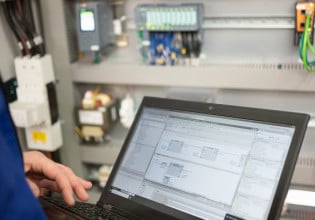Rockwell Offers Delta Motion for Replacement of ControlLogix Modules
Delta Motion RMC controllers offer a replacement to solve the upcoming discontinuation of Rockwell Automation’s ControlLogix analog modules for hydraulic and servo motion control systems.
Every once in a while, automation manufacturers are forced to discontinue products when the demands of the market exceed the capabilities of the device, typically after a long, successful tenure on the market.
Delta Motion Steps Up To The Plate
Rockwell Automation usually provides a replacement device or platform that is similar in function but upgraded with advanced new technology. Three specific devices, the 1756-HYD02, 1756-M02AS, and the 1756-M02AE, are all analog motion modules designed for the ControlLogix platform, but as of December 2024, they will no longer be for sale. In this rare instance, there is no substitute offered directly by Rockwell Automation’s Allen-Bradley hardware brand.
Fortunately for the factories that still use one of those mentioned modules, Detla Motion has stepped in with a solution. Delta Motion is a manufacturer of industrial control systems for servo-hydraulic and servo-electric motion applications. Recently, Delta announced the endorsed recommendation of the RMC motion controllers as a direct replacement for any one of the 1756-series modules listed above.

Rockwell has partnered with Delta Motion to provide a replacement for motion modules nearing their end-of-life. Image used courtesy of Delta Motion
RMC Motion Module
The RMC modules are a direct replacement of the outdated ControlLogix modules, they share all the same input and output characteristics as well as the ability to communicate with all of the currently supported field devices. The RMC modules communicate to ControlLogix PLCs via Ethernet/IP protocol, with both Rockwell Automation and Delta providing the proper add-on profiles and electronics datasheets. Delta Motion offers comprehensive customer support to help with the transition over to the RMC modules.
Motion Module Specifications
To provide output signals for peripheral devices, the RMC motion module can support ±10 V, 4-20 mA, and ±20 mA. The modules can connect to a variety of different feedback device protocols, such as quadrature, SSI, PWM, and discrete start/stop, with many analog options also available. The RMC comes in single or multiple-axis configurations with a maximum of 50 axes for synchronizing applications.
For programming, the RMC uses command-based functions so that most of the programming is offloaded to the PLC. Special software tools allow for configuration and programming and are free to download. For more advanced applications, Delta Motion has included extensive control algorithm options, including dual-loop, position-pressure, motion profile following, or position-force, all configurable and tunable with the proprietary RMCTools software

Simple network protocols provide a link between the ControlLogix platform and the RMC controller. Image used courtesy of Delta Motion
Partners in Motion
Rockwell Automation fully supports Delta Motion offering the RMC as a replacement for their outdated analog motion controllers. Rockwell even made Delta Motion a technology partner and recently invited them to share a booth at the Automation Fair in November. This partnership reassures customers that they are purchasing a quality product that will be supported for many years to come.
Automation Life Cycle
Automation components, when released for sale on the market, need to be supported for many years. It is common for automation components to be supported for several decades, and in the oil and gas industries, components need to be supported for up to 50 years (source link).
Why the need for such long-term support? It comes down to the replacement, because when components fail, the equipment cannot run. If the equipment is not running, the factory is losing money. In the oil and gas or energy industries, component failures lead to safety concerns that might stop energy production or even shut down the entire plant. These shutdowns can cause stock prices to rise or even cause inflation in global markets.
Most factories have a spare parts stock on hand so that downtime can be reduced as much as possible, but if those spare parts are no longer offered and cannot be replaced, then maintenance staff will need to source alternative components and investigate major changes and upgrades for the entire system.






